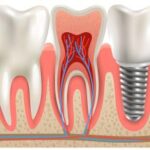The Solution to a Perfect Smile
When it comes to oral health, maintaining healthy teeth and gums is paramount. However, sometimes circumstances beyond our control can lead to dental problems such as decay and tooth loss. Dental implants offer a solution to these problems, providing patients with a comfortable and natural-looking replacement for their missing teeth.
What Are Dental Implants
Dental implants are artificial tooth roots composed of titanium. They are surgically placed into the jawbone beneath the gum line where they fuse with the bone over time, becoming a permanent fixture in the mouth. Once healed, an abutment is attached to the implant which then holds a dental crown or bridge in place.
Importance of Oral Health
Your oral health affects your overall health and well-being. Poor oral hygiene can lead to various health issues such as gum disease and tooth decay which have been linked to heart disease, diabetes, stroke, respiratory infections, and even Alzheimer’s disease. Regular visits to the dentist along with daily brushing and flossing can help maintain good oral health.
Benefits of Dental Implants
Dental implants offer numerous benefits for those who have lost teeth due to injury or decay:
- Natural Appearance: dental implants look and feel like natural teeth.
- Better Chewing Ability: with dental implants in place you can enjoy all your favorite foods without discomfort or difficulty chewing.
- Bone Preservation: when you lose teeth, bone loss can occur in your jawbone leading to further dental complications; however,dental implants preserve bone density by stimulating it just like natural teeth do.
- Prevents Gum Disease: Gaps between teeth can make it difficult to clean, increasing the risk of gum disease. Implants fill these gaps, making it easy to keep your teeth and gums clean.
The benefits of dental implants go beyond just the physical aspects. Patients have also reported improved self-esteem and a newfound confidence due to their newfound perfect smile.
Understanding Dental Implants
Procedure for Getting Dental Implants
The process for getting dental implants involves several steps, starting with a consultation with a dentist. During this initial visit, your dentist will evaluate your oral health and determine if you’re a good candidate for dental implant surgery. If you’re deemed eligible, your dentist will then begin preparing you for surgery by taking X-rays or CT scans to assess bone density and determine where to place the implant.
Before surgery can take place, it’s important to prepare properly in order to ensure successful placement. This may involve taking antibiotics or pain medication leading up to surgery day as well as avoiding certain foods or drinks that could interfere with healing.
Once preparation is complete, implant placement can begin. Depending on factors such as bone density and gum tissue thickness, either local anesthesia or sedation may be used during surgery.
During implant placement, an incision is made in the gum tissue where an artificial root is placed into the jawbone according to precise measurements taken through advanced imaging technology. Following implant placement comes healing which can last anywhere from several weeks up until several months depending on individual differences in health status including age, diet habits etc.. Throughout this time period there will be regular check-ups and follow-ups to ensure proper healing of the implant site as well as to monitor oral health.
Improving Oral Health with Dental Implants
Restoring missing teeth
One of the most obvious benefits of dental implants is that they replace missing teeth. When you lose a tooth, the bone beneath it can start to deteriorate. This can lead to a sunken face and difficulties with chewing and speaking.
By replacing missing teeth with dental implants, you can help prevent bone loss and maintain a healthy jawbone. Dental implants also look and feel like natural teeth, so you won’t have to worry about feeling self-conscious.
Improving speech and pronunciation
Missing teeth or ill-fitting dentures can make it difficult to speak clearly. This is because your tongue needs something to press against in order to form certain sounds, such as “t” or “s”. By filling in gaps with dental implants, you can improve your speech and pronunciation, which in turn can boost your confidence.
Enhancing chewing ability
When you have missing teeth or poorly fitting dentures, eating certain foods can be painful or difficult. Chewing on one side of your mouth for an extended period of time can cause strain on your jaw muscles. Dental implants allow you to eat a wider variety of foods without pain or discomfort.
Preventing bone loss
As mentioned earlier, when a tooth is lost the bone beneath it begins to deteriorate over time if not replaced by an implant or another device . This process is called resorption which leads to the shrinking of the jawbone. Dental implants are placed directly into the jawbone which helps stimulate the growth and development of new bone tissue.
Preventing gum disease
Gum disease is caused by bacteria that build up on your teeth over time if proper oral hygiene practices are not followed regularly. These bacteria attack the gums and cause them to become inflamed, which can eventually lead to tooth loss. Dental implants are easy to clean and maintain, which can help prevent gum disease from developing.
Maintaining healthy teeth and gums with dental implants
To keep your dental implants healthy and functioning properly, it’s important to practice good oral hygiene habits. This includes brushing at least twice a day with a soft-bristled brush, flossing daily, and using mouthwash as directed.
Regular visits to the dentist for cleanings and check-ups are also essential for maintaining healthy teeth and gums. By taking care of your dental implants, you can enjoy a healthier, more confident smile for years to come.
Caring for Dental Implants
Daily care routine for dental implant maintenance
After getting dental implants, it is essential to maintain proper oral hygiene to avoid any complications. A daily care routine should be established and followed meticulously. Brushing and flossing regularly are two critical components of maintaining good oral health with dental implants.
Use a soft-bristled toothbrush and a non-abrasive toothpaste twice a day to brush your teeth gently. To avoid harming the gums, use a mild circular motion while brushing the implant area.
Brushing techniques
When brushing, concentrate on the crown surfaces, making sure that you do not miss any spots around the implant area. Clean each tooth’s surface thoroughly by holding your brush at an angle, making small circular motions on top of your teeth in front and back of the hole in your mouth.
Flossing techniques
Flossing is equally important as brushing to prevent gum disease around dental implants. Cleaning between the teeth ensures that no food particles or harmful bacteria remain stuck in crevices inaccessible by a toothbrush or mouthwash. Patients can use waxed floss or unwaxed floss tape or nylon thread for cleaning between their teeth.
Mouthwash use
Mouthwashes can provide additional cleaning capabilities after brushing and flossing with traditional techniques. Using antibacterial mouthwash daily can help reduce inflammation in your gums and keep bacteria at bay.
Follow-up care after implant placement
After receiving dental implants, it’s crucial to visit your dentist regularly to ensure you’re following correct care practices, check on healing progress and monitor overall oral health status comprehensively.
Schedule a Consultation Today
Dental implants revolutionized dentistry by offering an excellent solution for missing teeth issues while contributing significantly to the overall oral health of individuals. Proper care is critical to ensure the dental implants last a lifetime without any complications.
Maintaining regular dental check-ups and following proper brushing and flossing techniques are just a few steps you can take towards optimal oral health with dental implants. Remember, prevention is better than cure, so don’t neglect your oral hygiene!
Take the first step towards optimal oral hygiene. Reserve your dental appointment at our Bingham Farms dental office now and experience personalized care.



